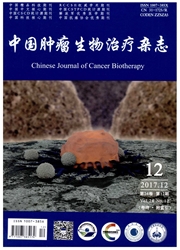

 中文摘要:
中文摘要:
目的:探讨靶向骨桥蛋白基因(osteopontin,OPN)的siRNA片段对U87胶质瘤细胞生长和侵袭力的影响及其可能的作用机制。方法:根据OPN基因序列设计并合成的siRNA片段(OPN-RNAi)转染U87细胞。MTT法检测U87细胞增殖;Western blotting检测OPN及基质金属蛋白酶(matrix metalloprotease,MMP)2、MMP9蛋白的表达;Transwell小室侵袭实验检测U87细胞的侵袭力;明胶酶谱法检测MMP2、MMP9的酶活性。结果:体外合成的OPN-RNAi能有效抑制U87细胞中OPN蛋白的表达(P〈0.05),OPN-RNAi同时还能下调MMP2、MMP9蛋白的表达(P〈0.05)及其酶活性(P〈0.01),并抑制U87细胞的增殖(P〈0.05)和侵袭力(P〈0.05)。结论:OPN-RNAi能够有效抑制U87胶质瘤细胞的生长及其侵袭力,其机制与其抑制OPN下游基因MMP2、MMP9的表达和酶活性有关。
 英文摘要:
英文摘要:
Objective:To study the effect of siRNA targeting osteopontin(OPN-RNAi)on the proliferation and invasiveness of U87 glioma cells and the possible mechanism.Methods: OPN-RNAi was synthesized according to the gene sequence of OPN protein and was transfected into U87 cells.The proliferation of U87 cells was examined by MTT;matrix metalloprotease(MMP) 2 and MMP9 expression were detected by Western blotting assay;transwell assay and gelatin-zymogram were used to detect the invasion ability of U87 cells and gelatinase acitivity of MMP2 and MMP9,respectively.Results: Synthesized OPN-RNAi effectively inhibited the expression of OPN in U87 cells(P〈0.05).OPN-RNAi also significantly decreased the expression of MMP2 and MMP9 in U87 cells(P〈0.05) and the gelation activity of MMP2 and MMP9(P〈0.01),and inhibited the proliferation and invasivenss of U87 cells(all P〈0.05).Conclusion: Knockdown of OPN with OPN-RNAi can inhibit the proliferation and invasiveness of U87 cells,which is probably related to the decreased expression of MMP2 and MMP9 genes and their gelatinase acitivities.
 同期刊论文项目
同期刊论文项目
 同项目期刊论文
同项目期刊论文
 Expression pattern of osteopontin splice variants and its functions on cell apoptosis and invasion i
Expression pattern of osteopontin splice variants and its functions on cell apoptosis and invasion i The contribution of the ABCG2 C421A polymorphism to cancer susceptibility: a meta-analysis of the cu
The contribution of the ABCG2 C421A polymorphism to cancer susceptibility: a meta-analysis of the cu Genetic oxidative stress variants and glioma risk in a Chinese population: a hospital-based case--co
Genetic oxidative stress variants and glioma risk in a Chinese population: a hospital-based case--co 期刊信息
期刊信息
